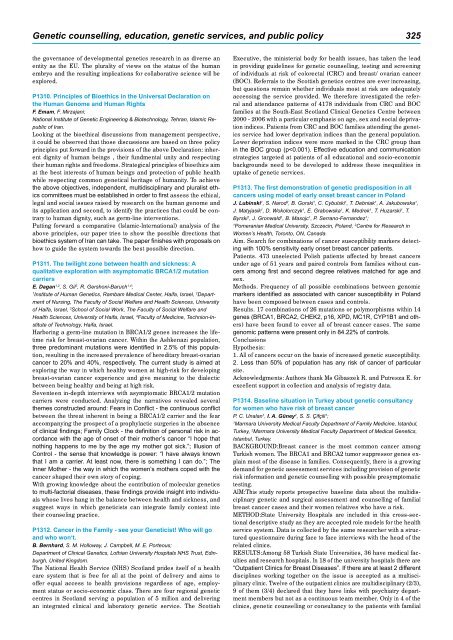European Human Genetics Conference 2007 June 16 – 19, 2007 ...
European Human Genetics Conference 2007 June 16 – 19, 2007 ...
European Human Genetics Conference 2007 June 16 – 19, 2007 ...
Create successful ePaper yourself
Turn your PDF publications into a flip-book with our unique Google optimized e-Paper software.
Genetic counselling, education, genetic services, and public policy<br />
the governance of developmental genetics research in as diverse an<br />
entity as the EU. The plurality of views on the status of the human<br />
embryo and the resulting implications for collaborative science will be<br />
explored.<br />
P1310. Principles of Bioethics in the Universal Declaration on<br />
the <strong>Human</strong> Genome and <strong>Human</strong> Rights<br />
F. Emam, F. Mirzajani;<br />
National Institute of Genetic Engineering & Biotechnology, Tehran, Islamic Republic<br />
of Iran.<br />
Looking at the bioethical discussions from management perspective,<br />
it could be observed that those discussions are based on three policy<br />
principles put forward in the provisions of the above Declaration: inherent<br />
dignity of human beings , their fundmental unity and respecting<br />
their human rights and freedoms. Strategical principles of bioethics aim<br />
at the best interests of human beings and protection of public health<br />
while respecting common genetical heritage of humanity. To achieve<br />
the above objectives, independent, multidisciplinary and pluralist ethics<br />
committees must be established in order to first assess the ethical,<br />
legal and social issues raised by research on the human genome and<br />
its application and second, to identify the practices that could be contrary<br />
to human dignity, such as germ-line interventions.<br />
Putting forward a comparative (Islamic-International) analysis of the<br />
above principles, our paper tries to show the possible directions that<br />
bioethics system of Iran can take. The paper finishes with proposals on<br />
how to guide the system towards the best possible direction.<br />
P1311. The twilight zone between health and sickness: A<br />
qualitative exploration with asymptomatic BRCA1/2 mutation<br />
carriers<br />
E. Dagan 1,2 , S. Gil 3 , R. Gershoni-Baruch 1,4 ;<br />
1 Institute of <strong>Human</strong> <strong>Genetics</strong>, Rambam Medical Center, Haifa, Israel, 2 Department<br />
of Nursing, The Faculty of Social Welfare and Health Sciences, University<br />
of Haifa, Israel, 3 School of Social Work, The Faculty of Social Welfare and<br />
Health Sciences, University of Haifa, Israel, 4 Faculty of Medicine, Technion-Institute<br />
of Technology, Haifa, Israel.<br />
Harboring a germ-line mutation in BRCA1/2 genes increases the lifetime<br />
risk for breast-ovarian cancer. Within the Ashkenazi population,<br />
three predominant mutations were identified in 2.5% of this population,<br />
resulting in the increased prevalence of hereditary breast-ovarian<br />
cancer to 20% and 40%, respectively. The current study is aimed at<br />
exploring the way in which healthy women at high-risk for developing<br />
breast-ovarian cancer experience and give meaning to the dialectic<br />
between being healthy and being at high risk.<br />
Seventeen in-depth interviews with asymptomatic BRCA1/2 mutation<br />
carriers were conducted. Analyzing the narratives revealed several<br />
themes constructed around: Fears in Conflict - the continuous conflict<br />
between the threat inherent in being a BRCA1/2 carrier and the fear<br />
accompanying the prospect of a prophylactic surgeries in the absence<br />
of clinical findings; Family Clock - the definition of personal risk in accordance<br />
with the age of onset of their mother’s cancer “I hope that<br />
nothing happens to me by the age my mother got sick.”; Illusion of<br />
Control - the sense that knowledge is power: “I have always known<br />
that I am a carrier. At least now, there is something I can do.”; The<br />
Inner Mother - the way in which the women’s mothers coped with the<br />
cancer shaped their own story of coping.<br />
With growing knowledge about the contribution of molecular genetics<br />
to multi-factorial diseases, these findings provide insight into individuals<br />
whose lives hang in the balance between health and sickness, and<br />
suggest ways in which geneticists can integrate family context into<br />
their counseling practice.<br />
P1312. Cancer in the Family - see your Geneticist! Who will go<br />
and who won‘t.<br />
B. Bernhard, S. M. Holloway, J. Campbell, M. E. Porteous;<br />
Department of Clinical <strong>Genetics</strong>, Lothian University Hospitals NHS Trust, Edinburgh,<br />
United Kingdom.<br />
The National Health Service (NHS) Scotland prides itself of a health<br />
care system that is free for all at the point of delivery and aims to<br />
offer equal access to health provisions regardless of age, employment<br />
status or socio-economic class. There are four regional genetic<br />
centres in Scotland serving a population of 5 million and delivering<br />
an integrated clinical and laboratory genetic service. The Scottish<br />
Executive, the ministerial body for health issues, has taken the lead<br />
in providing guidelines for genetic counselling, testing and screening<br />
of individuals at risk of colorectal (CRC) and breast/ ovarian cancer<br />
(BOC). Referrals to the Scottish genetics centres are ever increasing,<br />
but questions remain whether individuals most at risk are adequately<br />
accessing the service provided. We therefore investigated the referral<br />
and attendance patterns of 4178 individuals from CRC and BOC<br />
families at the South-East Scotland Clinical <strong>Genetics</strong> Centre between<br />
2000 - 2006 with a particular emphasis on age, sex and social deprivation<br />
indices. Patients from CRC and BOC families attending the genetics<br />
service had lower deprivation indices than the general population.<br />
Lower deprivation indices were more marked in the CRC group than<br />
in the BOC group (p


